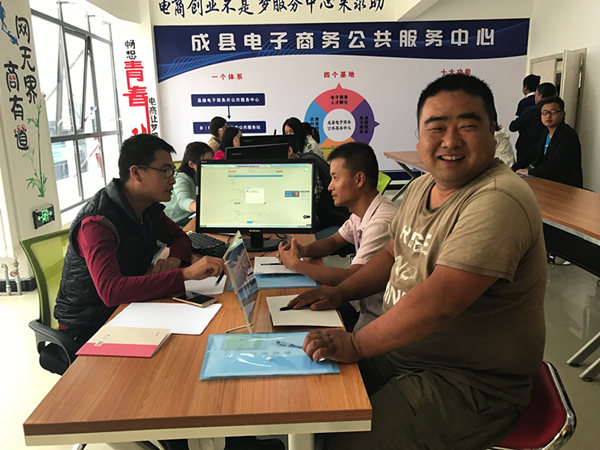E-commerce: Changing the landscape of rural poverty
GPIG by Zhang Ling, November 2, 2016 Adjust font size:
As the Internet becomes more widely accessible, creative ways to reduce poverty such as e-commerce have been applied in many areas. These make full use of the channels connecting rural and urban markets, thus creating potential jobs and boosting rural economy.
E-commerce rural service center in Cheng County [GPIG/Photo by Jiao Meng]
From Street Vendor to Online Seller
Cheng County, in northwestern China's province of Gansu, has recently made exemplary efforts: it has managed to shake off poverty by selling agricultural products via warehouse-based online trading.
The county is a land rich in minerals as well as solar and animal agriculture resources. Many residents engage in the sale of agricultural products. They process these regional specialties in scattered family workshops and then carry them in bags to markets around neighboring counties and villages. Transaction volumes are low, sales are uncertain, and the marketing model is energy-consuming.
To make the matter worse, it is difficult to connect farmers to markets, particularly those living in poor regions with scant commercial infrastructures and information imbalances.
In June 2013, the county became the first pilot zone for poverty reduction through e-commerce in northwest China. It not only decreases information asymmetry between producers and consumers, but also accelerates connectivity between sales channels and platforms. Keeping in touch with changes in consumer demands and market fluctuations, local farmers expand their income and reduce poverty by selling their agricultural products on the national market.
According to the local government, there are 102 impoverished villages in the county, among which 81 are now connected to high-speed Internet, offering the possibility to start local online businesses. Up to now, 17 towns have been covered, with 890 online shops opened and even more e-commerce service providers engaged.
Importantly, e-commerce not only provides more employment opportunities for rural residents, but also drives more college graduates and migrant workers back home where they can be self-employed.
"Zhang Xuan, a college-graduate village official who served for Cheng County, used to help us sell our products, such as free-range chicken and walnuts, via an online shop," said local farmers.
"Farmers are expected to escape poverty by increasing off-farm income. In the past, farmers spent their leisure time playing cards, gossiping or watching TV during the off-season. But today, sitting in front of computers, they manage online stores," added a local official.
